Clean energy can be the answer to our gas woes
The electricity price hikes have peaked, while gas is high and rising. That was the conclusion last month from the NSW pricing regulator, confirming what power companies have known for some time – and it’s just the start of the bad news for Australian businesses and residents.
The significant rise in gas prices is starting to impact householders who rely on it for heating and cooking, as well as manufacturers and other major energy users who are already struggling due to the high Aussie dollar. It’s also making the power sector think seriously about the affordability of using gas to generate electricity.
The average gas bill in NSW is set to go up by just under 9 per cent next year. And it is likely to keep moving higher, according to the report released by the Independent Pricing and Regulatory Tribunal (IPART). Couple that with a prediction that gas prices could triple on Australia’s east coast within the next 10 years, as gas companies sell increasing volumes overseas, and you’ve got an expensive scenario for Australian businesses and households already battling with their energy bills.
Increased demand from countries like China, Korea and Japan, who are less endowed with renewable energy resources than we are, means local producers can make more money by sending our gas offshore. The world wants our gas and is prepared to pay handsomely for it.
Maximising the benefit from our substantial gas reserves while minimising what we pay for electricity down under is a problem that currently has many policymakers scratching their heads.
There seems to be little appetite for heavy-handed government intervention to force local gas producers to sell cheap gas to a local market and lose out on the additional profits that can be made in overseas markets.
But there is a solution to all this – a combination of energy efficiency and renewable energy.
There are two points to be made here, which together mean we can maximise our economic bottom line by exporting gas to our neighbours.
The first is that the use of energy smart technology by businesses and households and smarter grid technology can cut the amount of overall energy we need, reducing our reliance on domestic gas and our exposure to volatile and higher prices in the future. Any gas we do consume should be used as efficiently as possible, such as through distributed cogeneration which provides both heat and power.
The second point is that more of Australia’s energy can be generated by low-cost renewable energy, which is getting cheaper all the time.
Like our expansive natural gas reserves, Australia almost has an embarrassment of riches when it comes to renewable energy resources. But unlike gas, our sunshine, wind and waves cannot be exported, and are immune to the kind of international cost pressures that are forcing prices up for businesses and households.
Building a brand new renewable energy power plant is currently more expensive than relying on ageing infrastructure like coal-fired power plants. But the difference is not as large as many would like to make out.
With the support of the 20 per cent Renewable Energy Target, the costs of building and producing renewable energy are coming down – and fast.
Recent analysis by the Australian Bureau of Resources and Energy Economics showed that wind and solar are rapidly closing in on gas and coal, and will be cost-competitive within the next decade. And SKM estimates that the Renewable Energy Target will have unlocked more than $35 billion in investment by the time it is done, if left largely unchanged.
The modest amount of support renewable energy requires now can ensure we take advantage of the massive regional demand for gas, while protecting our own economy from these higher energy prices. Talk about having your cake and eating it too.
Kane Thornton is Deputy Chief Executive of the Clean Energy Council.
















